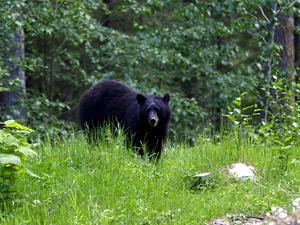A fed bear is a dead bear. “The old adage couldn’t be more true,” said Andrew Anaka, Powell River conservation officer, who sees the problem as “mainly a people issue rather than a bear one.”
This message has been particularly well received in some communities around the province. Since 2009 four communities in BC have been certified by the ministry of environment as Bear Smart.
Bears are currently foraging for food, and within the Powell River region the number of bear sightings and reports of bears “behaving badly” have risen considerably over the past couple of months.
Garbage is the biggest attractant for bears. “It’s like fast-food,” said Anaka. “They just love it. People have to take responsibility. The answer is to be aware of our behaviour and what we do to attract bears to the community.” Without food around, bears may wander through, but they’re not going to stick around, he said.
Human-bear conflicts escalate when bears are fed and become accustomed to people. “When they’re cubs and 60 pounds they’re really cute,” he said. “Unfortunately they grow up.”
Last year over 600 bears were destroyed in BC and in Powell River, “in the neighbourhood of a dozen,” said Anaka. “A number of those had been habituated by people feeding them.”
In many communities, conservation officers work together with WildSafe BC, which recently changed its name from Bear Aware and is a provincial program sponsored by BC Conservation Foundation (BCCF). WildSafe BC assists the conservation officers with delivering neighbourhood education about bear attractants. Beyond education programs, conservation officers have the ability to give fines for people who knowingly and unknowingly feed bears.
“We’re not going to change the bear’s behaviour,” said Anaka, “but we can change people’s.”
Bear Smart is a preventive, voluntary conservation program designed by the ministry together with BCCF and the Union of BC Municipalities.
Squamish has been certified since 2010, but started the process in 2005.
“In 2004, we had 27 bears that were destroyed within district boundaries,” said Meg Toom, WildSafeBC coordinator for Squamish. “Conservation officers together with some folks from the community took it to council and said this is not okay.”
The process started at the top level with the municipality committing money to bear-proofing infrastructure such as wildlife resistant garbage cans.
“We had to show the community that the municipality was toeing the line,” said Toom, “and so now we needed the residents to do so as well.”
A big step in the process happened when the company that handles household solid waste moved to an automated pickup system with bear-proof totes. Garbage pickup was reduced to every two weeks.
“We needed to have locks put on our garbage cans because leaving garbage for two weeks, particularly in the summer, was going to be an open invitation,” she said.
The process to becoming Bear Smart also included adding a wildlife attractant bylaw for Squamish.
“We work very closely with the conservation officer service and Squamish’s bylaw enforcement office,” said Toom. “If education isn’t working we have the teeth of a bylaw.”
Toom said the city tries hard to get voluntary compliance and will issue a warning ticket first before fines are handed out.
“Leadership from local government is essential because we can be educating as much as possible but if the municipality is not on board or behind the whole program it loses some of its validity,” said Toom.
“One of the biggest benefits of locking up the garbage is that it provides conservation officers with a few more tools in their tool kit,” she said. She told a story of how conservation officers hazed a bear with rubber bullets to scare it away when it had got into somebody’s recycling.
“A few years ago, there was no way they would practice that because the bear would just move on to the next house that had available garbage,” she said. “Now that the garbage is locked they can haze it out of the area.”
As the availability of garbage has been reduced the number of complaints have gone down. “It’s mostly sightings now,” she said. “It’s not a perfect system and never will be.”



